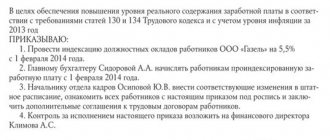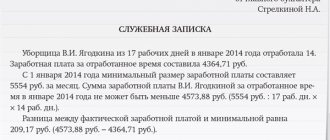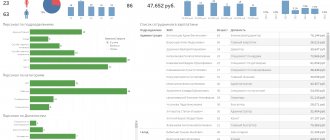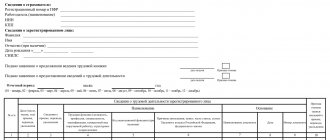Will there be a salary increase for civil servants in 2020?
The last indexation of salaries of civil servants was carried out in 2013. The freezing of the incomes of officials was carried out in order to save the budget in difficult times for the country.
The news about the salary increase was first announced at the end of 2020. Representatives of the Ministry of Labor and Social Protection of the Russian Federation officially announced that the first indexation will occur in 2020, the second will follow in 2020.
The basis of the mechanism for reforming the remuneration system for civil servants will be the criterion principle. It is necessary to fulfill its main goal - attracting young personnel capable of effectively and quickly solving pressing issues, and reducing the total number of officials.
On a note! Will there be an increase in salaries for public sector employees?
Figure 1. Increase in income of government employees.
Based on what law will the salaries of civil servants be raised?
To increase the salaries of civil servants in 2020, the Government of the Russian Federation issues a special resolution, on the basis of which in Russia all public sector employees in different regions will have their salaries increased.
The latest news says that there will be increases in the salaries of civil servants. The Ministry of Finance of the Russian Federation and the Ministry of Social Protection report that salaries need to be increased for civil servants, for whom they have not been increased for 5 years.
The salary increase for civil servants is planned for October 2019. According to statistics, today there are 90 citizens of the Russian Federation per official. In the context of digitalization of public administration in Russia, this is considered ineffective and unprofitable.
In this regard, head of government Dmitry Medvedev signed order No. 145 of March 13, 2020 on increasing salaries for civil servants. It was this document that became the main source of information that wages for federal civil servants are expected to increase in 2020.
The government order states that the current salary of public sector employees will be increased by 4.3% from October 1, 2020.
4.3% is the inflation rate fixed by the Ministry of Finance in 2020. According to the law, the salary of budget employees increases in the amount of the official inflation rate for the past year in accordance with Art. 134 of the Labor Code of the Russian Federation.
In the Russian Federation, according to the Ministry of Finance, inflation is expected to be 6% in 2020. The government is trying to increase the salaries of federal civil servants in 2020 in Russia to compensate for the fall in their basic income.
However, the latest news does not indicate who exactly will receive salary increases and who will be laid off this year. All this causes an unhealthy stir among those who work in the public sector. The government order states that salary increases and staff optimization are expected among civil servants, but not everyone understands who belongs to this category of workers.
By how much and how will wages be increased?
The growth of officials' incomes in the coming years will have its own characteristics. Each salary indexation will increase the employee’s salary by 4%.
Today, the monthly remuneration of a civil servant consists of several parts:
- official salary;
- salary according to rank;
- additional payments for length of service;
- additional payments for increased complexity of work, secrecy.
Table 1. Types and amounts of additional payments to an official’s salary in 2018*
| Type of surcharge | Amount of additional payment, % |
| For length of service (experience up to 5 years) | 15 |
| For years of service (experience from 5 to 10 years) | 20 |
| For years of service (experience from 10 to 20 years) | 30 |
| For secrecy or special complexity | 60–200 |
*According to information and analytical portal 1RRE
It is assumed that indexation will affect the basic components of salaries. Serious changes will affect incentive payments, which, apparently, will not be maintained on the usual scale. They will no longer be universal: each employee will need to prove the actual fulfillment of the required conditions and the facts of processing individually.
In 2020, the state budget allocated 380 billion rubles for such additional payments. Young professionals will be able to count on improved funding, since there is a need to attract active, qualified employees to the government apparatus.
Figure 2. Grigory Vedekhin - head of the village administration of Khani, Neryungri district and the youngest high-level official in Russia
New tariffs and expected wage indexation
The authorities are actively talking about the almost reached threshold of budget salaries in the region of 80% of the Russian average. In fact, it is hardly possible to compare these indicators, especially in different territorial areas of the country. The average income in Russia received in the Altai Republic can be considered a really good salary. The same amount in the Moscow region, in the capital itself, or in any large city will already be considered excessively small.
However, so far no one is talking about a value of 150%. They haven’t even reached the average payments in Russia yet, but have stopped at 80% of them. Moreover, the indexation of these 80% is planned in a reduced mode. It will not be proactive, but will only become compensating later, i.e. Salaries will be indexed at the end of the year, in October. This is all due to the same economic crisis - the budget does not have enough funds for the planned payments.
The fact that the amounts are different confuses people, although both numbers are large, which indicates potential difficulties. For now, they are still trying to “find” this money in the budget, although they do not forget about indexation. Its size has already been announced. This is 4-4.1%. This decision, in addition to the shortage of funds, is also explained by the final increase in salaries from January 2020. The incomes of public sector employees will finally be equal to the subsistence level, and it is also growing every year. This means that wage growth will be greater than that 4%.
Tariff changes are also expected:
- Prohibition of salaries below the minimum wage for full-time employment.
- Abolition of 27 tariff categories.
- Formation of a new grid with 17 bits.
- It is planned to distribute employees according to qualification groups.
- Separation of powers between authorities and municipalities in remuneration.
- Partial delegation of centralized additional payments to the management of educational institutions.
For now, these are plans, as well as the long-promised salary of 150% of the national average. However, we need to be fair - statistically there are already more than half, that same 80%. The next increase in January 2019 will potentially narrow the gap. This means that the authorities will be one more small step closer to implementing the May decrees.
Now you shouldn’t expect a big salary, but you don’t need to look for a positive trend - it can be seen with the naked eye. Albeit slowly and not very convincingly, but still the salaries of public sector employees are increasing, even managing to slightly outpace rising prices.
When will the salary increase take place?
The increase in salaries of government employees will be carried out simultaneously with the indexation of military salaries, namely no earlier than October 1, 2020. The criterion principle, designed to optimize the activities and composition of municipal employees, is not ready at this time; development is underway in the authorized government bodies.
Its entry into force is scheduled for the beginning of 2020. During the year, the final version of the new remuneration system will be approved.
Important! Indexation of remuneration for teachers' work is planned for January-February 2020.
Dynamics of income growth of civil servants in Russia
Statistical studies show a steady increase in the income of civil servants, despite official statements about a wage freeze in this sector. Such dynamics are possible due to staff reductions, especially the dismissal of officials from low-paid positions.
Table 2. Dynamics of salary growth for officials from 2006 to 2018*
| Year | Salary amount, rub. |
| 2006 | 20 200 |
| 2009 | 42 500 |
| 2012 | 60 100 |
| 2014 | 69 500 |
| 2015 | 95 000 |
| 2016 | 115 700 |
| 2017 | 119 000 |
| 2018 | 132 500 |
| 2019 | 137 800 |
*According to Visasam, 1RRE
Figure 3. Graph of growth in average monthly wages of civil servants. Sources: Visasam, 1RRE
How much do officials earn?
The algorithm for calculating wages for civil servants is quite complex, as it must take into account a large number of factors.
Various allowances for experience, working conditions, and bonuses make it possible that in the same positions in different regions people can receive salaries that differ several times.
The salary itself, without additional payments, is formed from the number of units of account that are accrued to the employee. This number directly depends on the position of the official. One unit of account is now equal to 1,300 rubles. But the number of units of account is different everywhere.
The following numbers are valid in St. Petersburg:
- a junior specialist receives from 17 to 19 calculation units;
- deputies receive a salary equal to 33 units of account;
- the chairman of the city administration can claim 35 units of account;
- The regional governor receives 60 units of account.
Thus, the net salaries of officials are really not very large. They may exceed the average salary in the region, but not several times and not in all cases. However, one cannot fail to take into account the various bonuses that employees receive. Already in the first year of work, their salary is increased by 10%. After five years of service there is a 15% increase.
In some cases, the salary can be increased several times. This may be affected by the special conditions in which the civil servant works. Taking into account other possible increases, an experienced employee with any achievements can actually receive salaries that amount to hundreds of thousands of rubles. But this is not a universal phenomenon - such bonuses really need to be earned.
By the way, the Ministry of Labor often raises the question that the system of calculating salaries of officials needs to be reformed. From the information given above, it becomes clear that it is very difficult to find out the real salary of a civil servant due to the large number of variables taken into account in the calculation.
But we must not forget about ordinary employees who do not yet have either serious experience or outstanding achievements. Their salary can be very small - an ordinary official can receive 25 thousand.
And for such people, even a small indexation will be really useful, because they, along with the ordinary population, have to experience the consequences of inflation. After all, their salaries have not been revised for 5 years and surviving with such a salary in a crisis is becoming increasingly difficult.
Who belongs to the category of civil servants
The category of civil servants includes those who work in federal and regional legislative and executive bodies and courts. These include employees:
- Office of the President of the Russian Federation;
- divisions of the Prosecutor's Office;
- Tax Service branches;
- Rosreestr;
- Rospotrebnadzor;
- Migration Service;
- Customs Service;
- Border Service;
- Administrations, Legislative Assemblies and other similar institutions.
According to experts, Russia's administrative apparatus remains overloaded, despite Rosstat's data on cuts being carried out within it. Thus, in 2020, a reduction in the number of officials by 10% was achieved.
It is officially stated that the country's budget finances about 5.4 million jobs for civil servants, some of which have an extremely high level of content. In the future, such employees will receive improved pension benefits.
Figure 4. Russian officials
On a note! How much do State Duma deputies earn in Russia and abroad?
What is the average salary of civil servants now?
The income of government employees directly depends on their status:
- In the government apparatus, the average income of an employee exceeds 227 thousand rubles. per month.
- A seat in the Federation Council allows you to have a monthly income of 180.2 thousand rubles.
- Among departments and ministries, specialists from the Federal Treasury receive the highest salaries - 160 thousand rubles. per month.
Figure 5. Federal Treasury of Russia
Expert assessment
Many analysts are confident in the need to increase salaries for civil servants in different proportions. The whole point is that there is too noticeable differentiation in the salaries of representatives of public services.
For example, the salary of employees working in the presidential administration is 216 thousand, the salary of representatives of the Prosecutor General’s Office is 84 thousand rubles, and representatives of the Ministry for the North Caucasus region receive only 38 thousand per month. This state of affairs may encourage less “wealthy” professionals to increase their income through illegal actions.
Experts are confident that in order to avoid such developments, salaries should be increased for the more “needy” category of civil servants. This will not only prevent possible violations of the law, but will also become an incentive for young Russians to join the ranks of representatives of government agencies.











